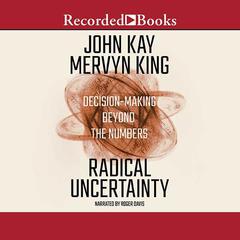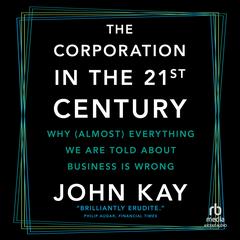 Play Audiobook Sample
Play Audiobook Sample
Other People's Money: The Real Business of Finance Audiobook
 Play Audiobook Sample
Play Audiobook Sample
Quick Stats About this Audiobook
Total Audiobook Chapters:
Longest Chapter Length:
Shortest Chapter Length:
Average Chapter Length:
Audiobooks by this Author:
Publisher Description
The finance sector of Western economies is too large and attracts too many of the smartest college graduates. Financialization over the past three decades has created a structure that lacks resilience and supports absurd volumes of trading. The finance sector devotes too little attention to the search for new investment opportunities and the stewardship of existing ones, and far too much to secondary-market dealing in existing assets. Regulation has contributed more to the problems than the solutions. Why? What is finance for? John Kay, with wide practical and academic experience in the world of finance, understands the operation of the financial sector better than most. He believes in good banks and effective asset managers, but good banks and effective asset managers are not what he sees. In a dazzling and revelatory tour of the financial world as it has emerged from the wreckage of the 2008 crisis, Kay does not flinch in his criticism: we do need some of the things that Citigroup and Goldman Sachs do, but we do not need Citigroup and Goldman to do them. And many of the things done by Citigroup and Goldman do not need to be done at all. The finance sector needs to be reminded of its primary purpose: to manage other people’s money for the benefit of businesses and households. It is an aberration when the some of the finest mathematical and scientific minds are tasked with devising algorithms for the sole purpose of exploiting the weakness of other algorithms for computerized trading in securities. To travel further down that road leads to ruin.
Download and start listening now!
“[Other People’s Money] should be read by everyone concerned with preventing the next crisis…[Kay] skewers the pretensions of the finance sector and questions whether its high rewards reflect its true economic contribution. Barely a page goes by without an acute observation or pithy aphorism…Above all, the finance sector should be judged on the same basis as other industries; if an activity is unprofitable without taxpayer support, it should not occur. ‘Our willingness to accept uncritically the proposition that finance has a unique status has done much damage,’ the author wisely says. Let us hope those in authority will listen.”
— Economist
Quotes
-
“Kay is an admirable debunker of myths and false beliefs—he can see substantial things that others don’t.”
— Nassim Nicholas Taleb, New York Times bestselling author -
“Mr. Kay is a brilliant writer with an ability to explain the role in the 2007–08 financial crisis of such concepts as credit default swaps, collateralized debt obligations and moral hazard…[He] is at his best in reminding us that the financial system is still fragile and in explaining that more regulation is not the answer…We can applaud his call for a cultural change that will enhance ethical standards and put the customer first.”
— Wall Street Journal -
“Other People’s Money is not merely another broadside content to denounce finance’s dysfunction, but rather a masterly attempt to locate its various origins and connect them with analytical and theoretical rigor. Kay provides by way of context a panoptic overview of the history, evolution and structure of the financial system in the United States and Britain, one that is impressive in its ability to weave together a comprehensive range of material, from the mechanics of banking to the Gaussian copula, in elegant, jargon-free prose.”
— New York Times Book Review -
“Kay is both a first-class economist and an excellent writer.”
— Financial Times -
“A clear primer on modern financial systems and a scathing indictment of them.”
— Foreign Affairs -
“Kay’s insistence on stepping back, on judging finance by the humdrum standards of any other industry, with its self-serving mystique and aura of inevitability stripped away, makes Other People’s Money one of the best two or three books I’ve read on the crash.”
— Bloomberg View -
“A challenging book that will add to ongoing discussion and debate.”
— Booklist -
“Sobering and lucid. If you’re moved to keep your money in a sock after reading this, you’d have cause.”
— Kirkus Reviews -
“The theme of broken governance and accountability is echoed in economist John Kay’s Other People’s Money: The Real Business of Finance, which provides an accessible exposé of the complex and layered modern financial system and the failure of laws and regulations to protect the public. Whether his specific proposals are the best approach, policy won’t change unless many more people recognize the issues and demand better. Lack of political will remains the biggest challenge.”
— Anat Admati, George G. C. Parker Professor of Finance and Economics, Stanford Graduate School of Business
Other People's Money Listener Reviews
Be the first to write a review about this audiobook!
About John Kay
John Kay is a visiting professor at the London School of Economics and a fellow of St. John’s College, Oxford University. He writes a weekly column for the Financial Times and is the author of several books, including Obliquity: Why Our Goals Are Best Achieved Indirectly. He lives in London.
About Walter Dixon
Walter Dixon is a broadcast media veteran of more than twenty years’ experience with a background in theater and performing arts and voice work for commercials. After a career in public radio, he is now a full-time narrator with more than fifty audiobooks recorded in genres ranging from religion and politics to children’s stories.


























